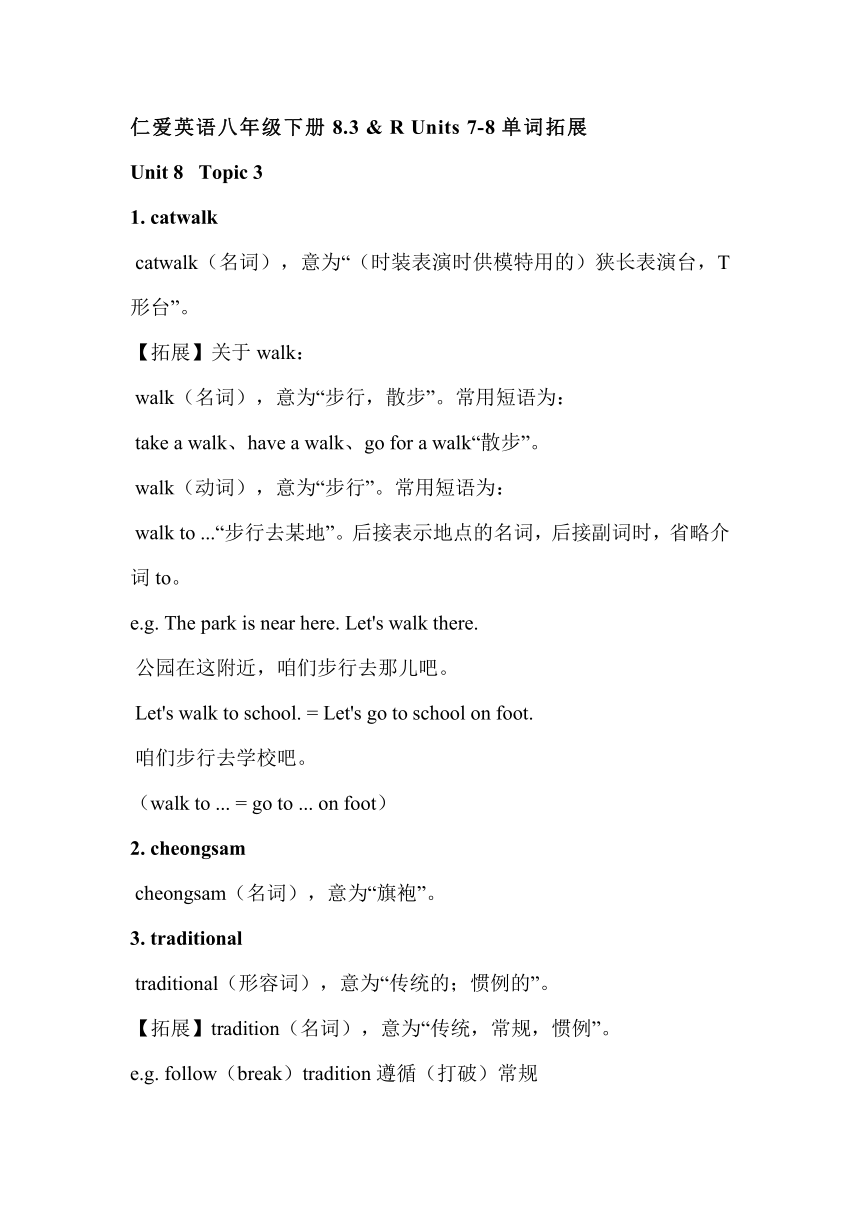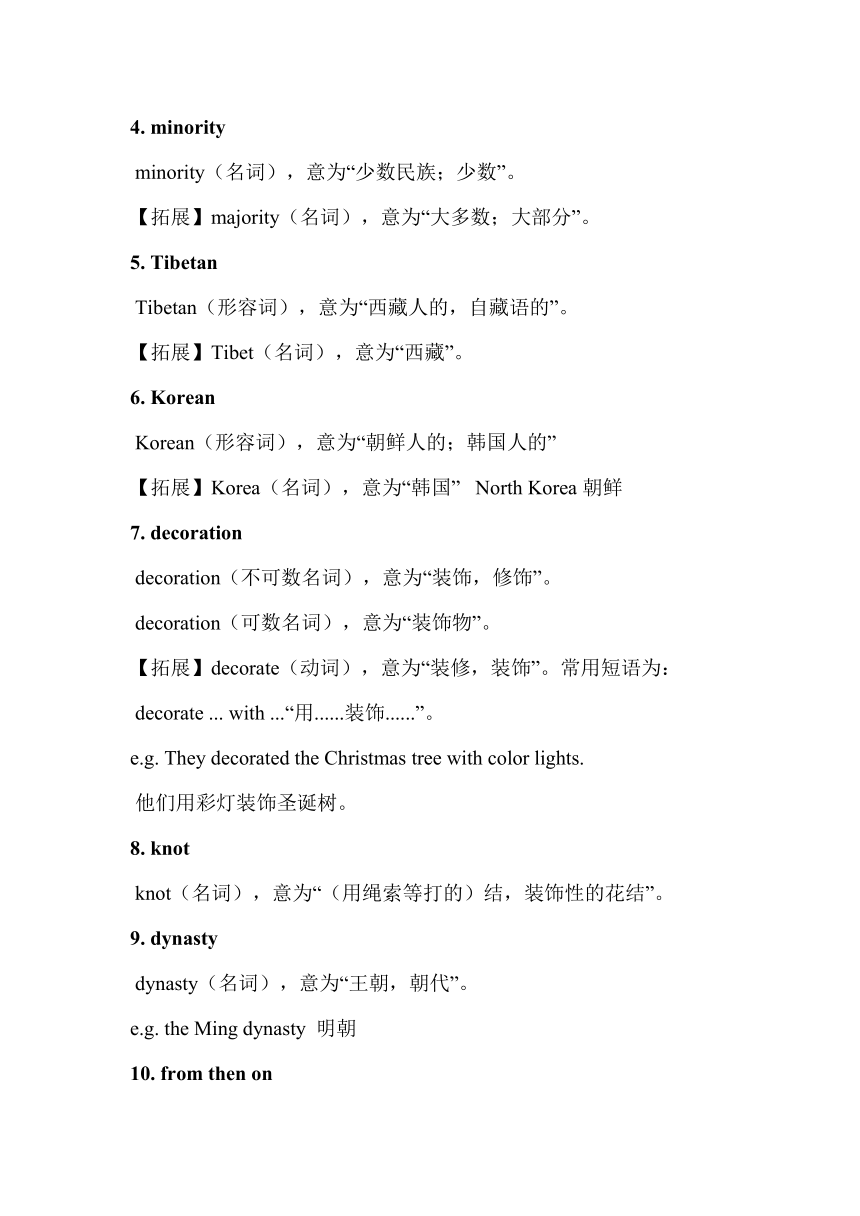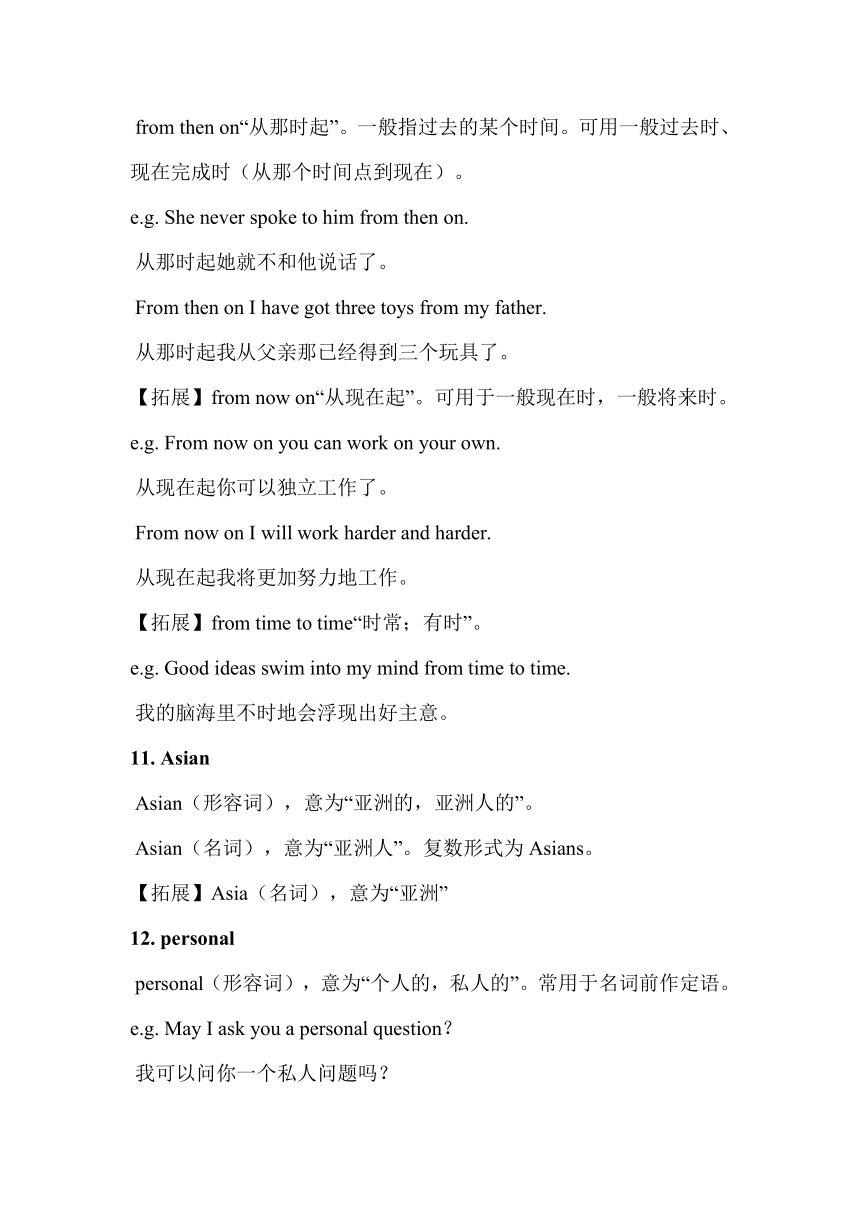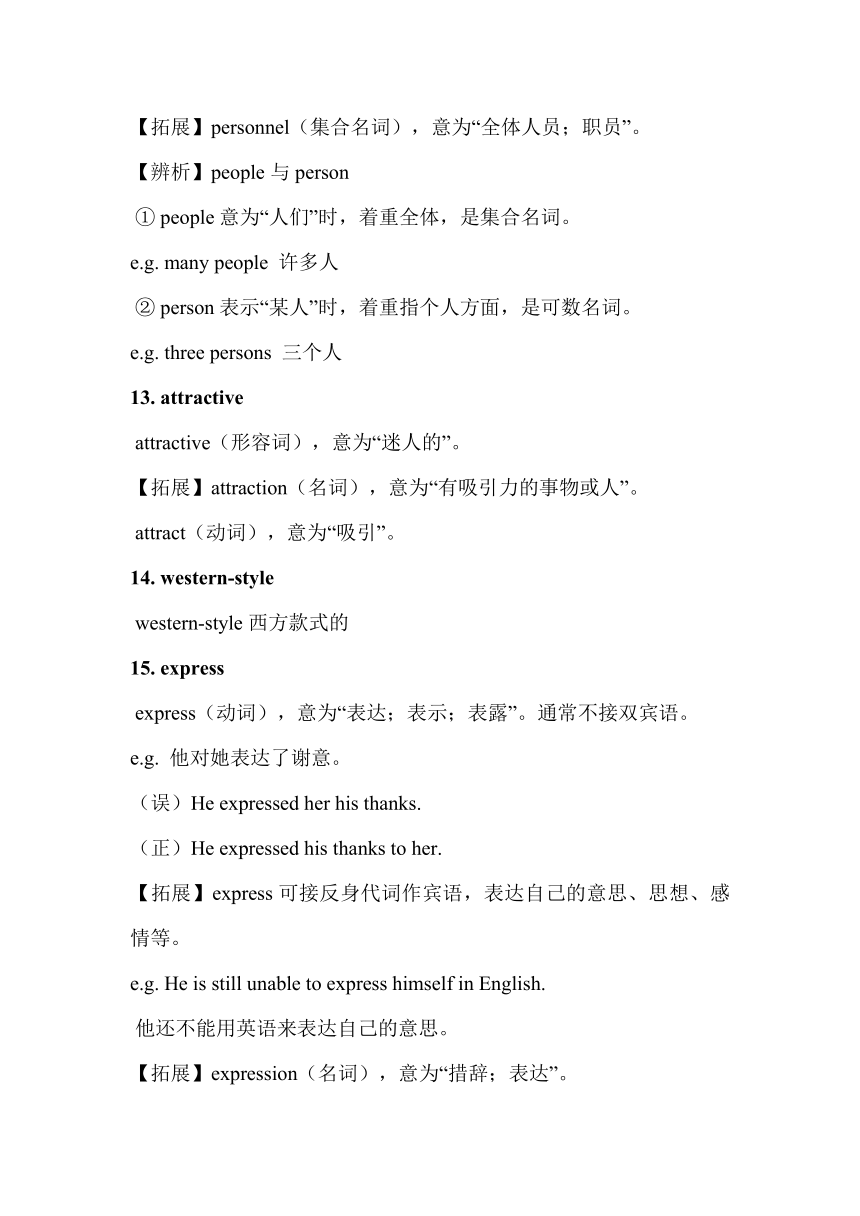仁爱英语八年级下册Unit 8 Topic 3 & Units 7-8单词拓展
文档属性
| 名称 | 仁爱英语八年级下册Unit 8 Topic 3 & Units 7-8单词拓展 |

|
|
| 格式 | docx | ||
| 文件大小 | 18.1KB | ||
| 资源类型 | 教案 | ||
| 版本资源 | 仁爱科普版 | ||
| 科目 | 英语 | ||
| 更新时间 | 2024-10-19 19:43:15 | ||
图片预览




文档简介
仁爱英语八年级下册8.3 & R Units 7-8单词拓展
Unit 8 Topic 3
1. catwalk
catwalk(名词),意为“(时装表演时供模特用的)狭长表演台,T形台”。
【拓展】关于walk:
walk(名词),意为“步行,散步”。常用短语为:
take a walk、have a walk、go for a walk“散步”。
walk(动词),意为“步行”。常用短语为:
walk to ...“步行去某地”。后接表示地点的名词,后接副词时,省略介词to。
e.g. The park is near here. Let's walk there.
公园在这附近,咱们步行去那儿吧。
Let's walk to school. = Let's go to school on foot.
咱们步行去学校吧。
(walk to ... = go to ... on foot)
2. cheongsam
cheongsam(名词),意为“旗袍”。
3. traditional
traditional(形容词),意为“传统的;惯例的”。
【拓展】tradition(名词),意为“传统,常规,惯例”。
e.g. follow(break)tradition遵循(打破)常规
4. minority
minority(名词),意为“少数民族;少数”。
【拓展】majority(名词),意为“大多数;大部分”。
5. Tibetan
Tibetan(形容词),意为“西藏人的,自藏语的”。
【拓展】Tibet(名词),意为“西藏”。
6. Korean
Korean(形容词),意为“朝鲜人的;韩国人的”
【拓展】Korea(名词),意为“韩国” North Korea朝鲜
7. decoration
decoration(不可数名词),意为“装饰,修饰”。
decoration(可数名词),意为“装饰物”。
【拓展】decorate(动词),意为“装修,装饰”。常用短语为:
decorate ... with ...“用......装饰......”。
e.g. They decorated the Christmas tree with color lights.
他们用彩灯装饰圣诞树。
8. knot
knot(名词),意为“(用绳索等打的)结,装饰性的花结”。
9. dynasty
dynasty(名词),意为“王朝,朝代”。
e.g. the Ming dynasty 明朝
10. from then on
from then on“从那时起”。一般指过去的某个时间。可用一般过去时、现在完成时(从那个时间点到现在)。
e.g. She never spoke to him from then on.
从那时起她就不和他说话了。
From then on I have got three toys from my father.
从那时起我从父亲那已经得到三个玩具了。
【拓展】from now on“从现在起”。可用于一般现在时,一般将来时。
e.g. From now on you can work on your own.
从现在起你可以独立工作了。
From now on I will work harder and harder.
从现在起我将更加努力地工作。
【拓展】from time to time“时常;有时”。
e.g. Good ideas swim into my mind from time to time.
我的脑海里不时地会浮现出好主意。
11. Asian
Asian(形容词),意为“亚洲的,亚洲人的”。
Asian(名词),意为“亚洲人”。复数形式为Asians。
【拓展】Asia(名词),意为“亚洲”
12. personal
personal(形容词),意为“个人的,私人的”。常用于名词前作定语。
e.g. May I ask you a personal question?
我可以问你一个私人问题吗?
【拓展】personnel(集合名词),意为“全体人员;职员”。
【辨析】people与person
① people意为“人们”时,着重全体,是集合名词。
e.g. many people 许多人
② person表示“某人”时,着重指个人方面,是可数名词。
e.g. three persons 三个人
13. attractive
attractive(形容词),意为“迷人的”。
【拓展】attraction(名词),意为“有吸引力的事物或人”。
attract(动词),意为“吸引”。
14. western-style
western-style西方款式的
15. express
express(动词),意为“表达;表示;表露”。通常不接双宾语。
e.g. 他对她表达了谢意。
(误)He expressed her his thanks.
(正)He expressed his thanks to her.
【拓展】express可接反身代词作宾语,表达自己的意思、思想、感情等。
e.g. He is still unable to express himself in English.
他还不能用英语来表达自己的意思。
【拓展】expression(名词),意为“措辞;表达”。
16. Mongolian
Mongolian(名词),意为“蒙古人”。
【拓展】Mongolia(名词),意为“蒙古”。
17. above
above(副词),意为“在(或向)上面”。
above(介词),意为“在......上面”。
【辨析】above,over与on
① above表示地理、空间位置,无“垂直”之意,可指“高于......”,但不接触另一物,反义词为below。
② over指一物体在另一物体的垂直上方,表示“在......正上方”,也不接触另一物,反义词为under。
③ on表示“在......上面”,常与另一物接触,反义词为beneath。
e.g. The temperature will stay above zero in the day time.
白天的气温将保持在零度以上。
The light is over my head. 灯在我的头顶上。
There are some books on the desk. 桌子上有一些书。
18. list
list(动词),意为“列清单,把......列表”。
list(名词),意为“一览表;名单”。
19. well-known
well-known(复合形容词),意为“众所周知的,著名的”。
【拓展】be well-known to sb.“被......所熟知”,相当于be famous to。
be well-known for sth.“因......而得名”,相当于be famous for。
be well-known as“以......而得名”,相当于be famous as。
It is well-known that ...“众所周知的是......”。
e.g. It is well-known that smoking is bad for our health.
众所周知的是吸烟对我们的健康有害。
20. item
item(名词),意为“一件商品(物品);项目”。
21. choice
choice(名词),意为“选择;挑选”。
e.g. He is faced with a difficult choice. 他面临一个艰难的抉择。
【注意】表示做出选择,通常用动词make。
e.g. We each have to make a choice. 我们每个人都得做出选择。
【拓展】① choice作不可数名词,常用于短语have no choice but to do sth.“除做某事以外,别无选择”或“只好做某事”。
e.g. I have no choice but to accept the fact.
除了接受这个事实外,我别无选择。
② choice的动词形式为choose,choose to do sth.“选择做某事”。
e.g. I choose to be your friend. 我选择做你的朋友。
22. marriage
marriage(名词),意为“结婚,婚姻”。
【拓展】① marry(及物动词),意为“结婚;嫁;娶”。
marry sb. “和某人结婚”
marry sb. to ...“把......嫁给......;让......娶......”
e.g. He married a pretty girl. 他娶了一位漂亮的姑娘。
The old man married his daughter to a rich businessman.
这个老人把他的女儿嫁给了一位富商。
② marry 也用作不及物动词,意为“结婚”。
e.g. He didn't marry until he was fifty. 他直到50岁才结婚。
③ get married“结婚”,get married to sb.“与某人结婚”。表示动作,后面不能与表示一段时间的状语连用。在表示“和某人结婚”这一状态时,常用be married to sb.结构,可以和表示时间短的状语连用。
e.g. Lucy and Joe got married last week. 露西和乔上周结婚了。
They have been married for ten years. 他们结婚已经十年了。
23. celebration
celebration(名词),意为“庆祝会;庆祝”
【拓展】celebrate(动词),意为“庆祝”,往往人作主语。
e.g. We celebrated the New Year with a party. 我们举行集会庆祝新年。
Review of Units 7-8
1. saleswoman
saleswoman(名词),意为“女售货员”。
【拓展】sale的常见短语:
for sale出售,待售 on sale廉价出售 sale goods甩卖品
【拓展】sale的动词形式是sell,意为“卖,销售”,其过去式、过去分词都是sold。sell常用的短语为:
① sell out动词短语,意为“卖光”。
e.g. The shop sold out all the shirts. 这家商店的衬衫都卖光了。
② be sold out意为“被卖光”。
e.g. All the shirts in this shop were sold out. 这家商店所有的衬衫都被卖光了。
【拓展】buy(动词),意为“买”。常用短语为:
buy sth. for sb. = buy sb. sth. “为某人买东西”。
e.g. My father bought a book for me. = My father bought me a book.
我的父亲为我买了本书。
2. mix
mix(动词),意为“混合,掺和”。
e.g. You can't mix oil and water. 你不能把油和水混合。
【拓展】mix(名词),意为“混合;混合物”。
3. as a result
as a result“(作为)结果”
e.g. He didn't work hard. As a result,he failed his exam.
他学习不努力,结果他考试不及格。
【拓展】as a result of ...“由于......;作为......的结果”
e.g. He was late as a result of the heavy snow.
由于雪大,他迟到了。
Unit 8 Topic 3
1. catwalk
catwalk(名词),意为“(时装表演时供模特用的)狭长表演台,T形台”。
【拓展】关于walk:
walk(名词),意为“步行,散步”。常用短语为:
take a walk、have a walk、go for a walk“散步”。
walk(动词),意为“步行”。常用短语为:
walk to ...“步行去某地”。后接表示地点的名词,后接副词时,省略介词to。
e.g. The park is near here. Let's walk there.
公园在这附近,咱们步行去那儿吧。
Let's walk to school. = Let's go to school on foot.
咱们步行去学校吧。
(walk to ... = go to ... on foot)
2. cheongsam
cheongsam(名词),意为“旗袍”。
3. traditional
traditional(形容词),意为“传统的;惯例的”。
【拓展】tradition(名词),意为“传统,常规,惯例”。
e.g. follow(break)tradition遵循(打破)常规
4. minority
minority(名词),意为“少数民族;少数”。
【拓展】majority(名词),意为“大多数;大部分”。
5. Tibetan
Tibetan(形容词),意为“西藏人的,自藏语的”。
【拓展】Tibet(名词),意为“西藏”。
6. Korean
Korean(形容词),意为“朝鲜人的;韩国人的”
【拓展】Korea(名词),意为“韩国” North Korea朝鲜
7. decoration
decoration(不可数名词),意为“装饰,修饰”。
decoration(可数名词),意为“装饰物”。
【拓展】decorate(动词),意为“装修,装饰”。常用短语为:
decorate ... with ...“用......装饰......”。
e.g. They decorated the Christmas tree with color lights.
他们用彩灯装饰圣诞树。
8. knot
knot(名词),意为“(用绳索等打的)结,装饰性的花结”。
9. dynasty
dynasty(名词),意为“王朝,朝代”。
e.g. the Ming dynasty 明朝
10. from then on
from then on“从那时起”。一般指过去的某个时间。可用一般过去时、现在完成时(从那个时间点到现在)。
e.g. She never spoke to him from then on.
从那时起她就不和他说话了。
From then on I have got three toys from my father.
从那时起我从父亲那已经得到三个玩具了。
【拓展】from now on“从现在起”。可用于一般现在时,一般将来时。
e.g. From now on you can work on your own.
从现在起你可以独立工作了。
From now on I will work harder and harder.
从现在起我将更加努力地工作。
【拓展】from time to time“时常;有时”。
e.g. Good ideas swim into my mind from time to time.
我的脑海里不时地会浮现出好主意。
11. Asian
Asian(形容词),意为“亚洲的,亚洲人的”。
Asian(名词),意为“亚洲人”。复数形式为Asians。
【拓展】Asia(名词),意为“亚洲”
12. personal
personal(形容词),意为“个人的,私人的”。常用于名词前作定语。
e.g. May I ask you a personal question?
我可以问你一个私人问题吗?
【拓展】personnel(集合名词),意为“全体人员;职员”。
【辨析】people与person
① people意为“人们”时,着重全体,是集合名词。
e.g. many people 许多人
② person表示“某人”时,着重指个人方面,是可数名词。
e.g. three persons 三个人
13. attractive
attractive(形容词),意为“迷人的”。
【拓展】attraction(名词),意为“有吸引力的事物或人”。
attract(动词),意为“吸引”。
14. western-style
western-style西方款式的
15. express
express(动词),意为“表达;表示;表露”。通常不接双宾语。
e.g. 他对她表达了谢意。
(误)He expressed her his thanks.
(正)He expressed his thanks to her.
【拓展】express可接反身代词作宾语,表达自己的意思、思想、感情等。
e.g. He is still unable to express himself in English.
他还不能用英语来表达自己的意思。
【拓展】expression(名词),意为“措辞;表达”。
16. Mongolian
Mongolian(名词),意为“蒙古人”。
【拓展】Mongolia(名词),意为“蒙古”。
17. above
above(副词),意为“在(或向)上面”。
above(介词),意为“在......上面”。
【辨析】above,over与on
① above表示地理、空间位置,无“垂直”之意,可指“高于......”,但不接触另一物,反义词为below。
② over指一物体在另一物体的垂直上方,表示“在......正上方”,也不接触另一物,反义词为under。
③ on表示“在......上面”,常与另一物接触,反义词为beneath。
e.g. The temperature will stay above zero in the day time.
白天的气温将保持在零度以上。
The light is over my head. 灯在我的头顶上。
There are some books on the desk. 桌子上有一些书。
18. list
list(动词),意为“列清单,把......列表”。
list(名词),意为“一览表;名单”。
19. well-known
well-known(复合形容词),意为“众所周知的,著名的”。
【拓展】be well-known to sb.“被......所熟知”,相当于be famous to。
be well-known for sth.“因......而得名”,相当于be famous for。
be well-known as“以......而得名”,相当于be famous as。
It is well-known that ...“众所周知的是......”。
e.g. It is well-known that smoking is bad for our health.
众所周知的是吸烟对我们的健康有害。
20. item
item(名词),意为“一件商品(物品);项目”。
21. choice
choice(名词),意为“选择;挑选”。
e.g. He is faced with a difficult choice. 他面临一个艰难的抉择。
【注意】表示做出选择,通常用动词make。
e.g. We each have to make a choice. 我们每个人都得做出选择。
【拓展】① choice作不可数名词,常用于短语have no choice but to do sth.“除做某事以外,别无选择”或“只好做某事”。
e.g. I have no choice but to accept the fact.
除了接受这个事实外,我别无选择。
② choice的动词形式为choose,choose to do sth.“选择做某事”。
e.g. I choose to be your friend. 我选择做你的朋友。
22. marriage
marriage(名词),意为“结婚,婚姻”。
【拓展】① marry(及物动词),意为“结婚;嫁;娶”。
marry sb. “和某人结婚”
marry sb. to ...“把......嫁给......;让......娶......”
e.g. He married a pretty girl. 他娶了一位漂亮的姑娘。
The old man married his daughter to a rich businessman.
这个老人把他的女儿嫁给了一位富商。
② marry 也用作不及物动词,意为“结婚”。
e.g. He didn't marry until he was fifty. 他直到50岁才结婚。
③ get married“结婚”,get married to sb.“与某人结婚”。表示动作,后面不能与表示一段时间的状语连用。在表示“和某人结婚”这一状态时,常用be married to sb.结构,可以和表示时间短的状语连用。
e.g. Lucy and Joe got married last week. 露西和乔上周结婚了。
They have been married for ten years. 他们结婚已经十年了。
23. celebration
celebration(名词),意为“庆祝会;庆祝”
【拓展】celebrate(动词),意为“庆祝”,往往人作主语。
e.g. We celebrated the New Year with a party. 我们举行集会庆祝新年。
Review of Units 7-8
1. saleswoman
saleswoman(名词),意为“女售货员”。
【拓展】sale的常见短语:
for sale出售,待售 on sale廉价出售 sale goods甩卖品
【拓展】sale的动词形式是sell,意为“卖,销售”,其过去式、过去分词都是sold。sell常用的短语为:
① sell out动词短语,意为“卖光”。
e.g. The shop sold out all the shirts. 这家商店的衬衫都卖光了。
② be sold out意为“被卖光”。
e.g. All the shirts in this shop were sold out. 这家商店所有的衬衫都被卖光了。
【拓展】buy(动词),意为“买”。常用短语为:
buy sth. for sb. = buy sb. sth. “为某人买东西”。
e.g. My father bought a book for me. = My father bought me a book.
我的父亲为我买了本书。
2. mix
mix(动词),意为“混合,掺和”。
e.g. You can't mix oil and water. 你不能把油和水混合。
【拓展】mix(名词),意为“混合;混合物”。
3. as a result
as a result“(作为)结果”
e.g. He didn't work hard. As a result,he failed his exam.
他学习不努力,结果他考试不及格。
【拓展】as a result of ...“由于......;作为......的结果”
e.g. He was late as a result of the heavy snow.
由于雪大,他迟到了。
同课章节目录
- Unit 5 Feeling excited
- Topic 1 You look excited
- Topic 2 I’m feeling better now.
- Topic 3 Many things can affect our feelings.
- Unit 6 Enjoying Cycling
- Topic 1 We're going on a three-day visit to Mount
- Topic 2 How about exploring Tian’anmen Square?
- Topic 3 Bicycle riding is good exercise.
- Unit 7 Food festival
- Topic 1 We’re preparing for a food festival.
- Topic 2 I’m not sure whether I can cook it well.
- Topic 3 I Cooked the Most Successfully
- Unit 8 Our Clothes
- Topic 1 We will have a class fashion show.
- Topic 2 We can design our own uniforms.
- Topic 3 He said the fashion show was wonderful.
